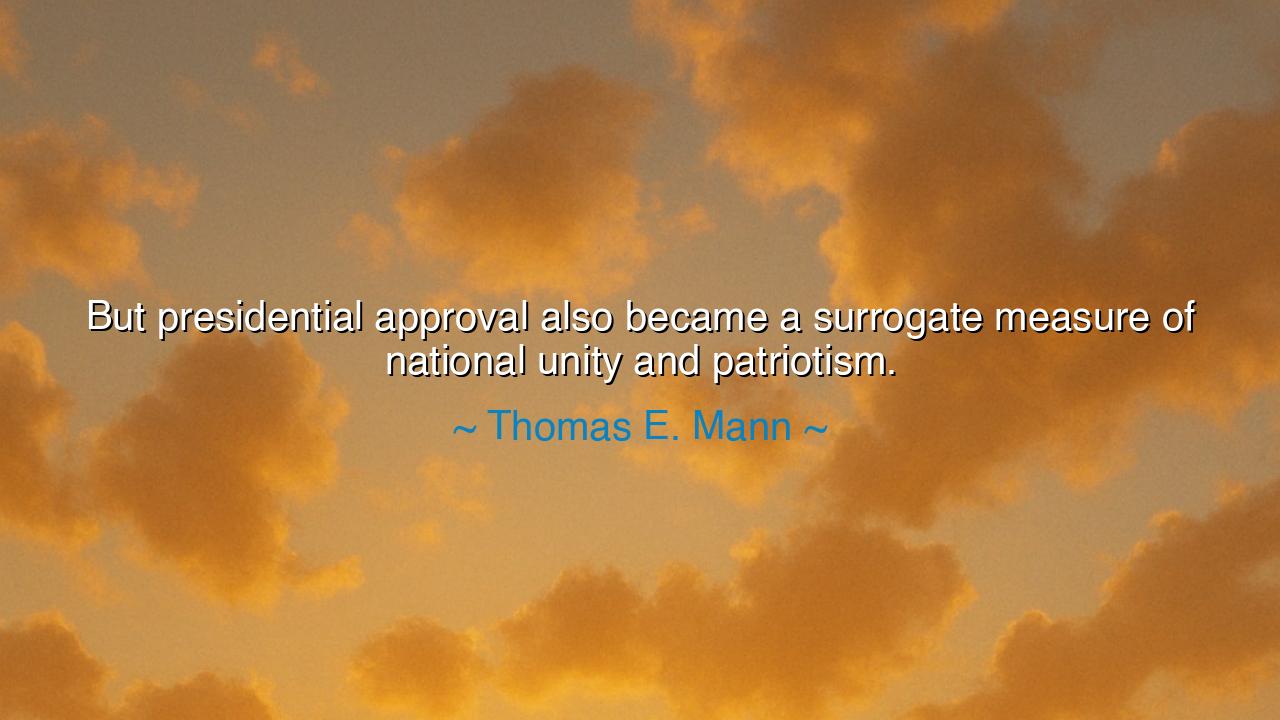
But presidential approval also became a surrogate measure of
But presidential approval also became a surrogate measure of national unity and patriotism.






“But presidential approval also became a surrogate measure of national unity and patriotism.” Thus declared Thomas E. Mann, a scholar of politics, a careful observer of the currents that sweep through democracies. In these words, he unveils a truth about the modern age: that the strength of a nation, the pulse of its unity, and the fervor of its patriotism are too often reduced to a single number—the approval of one leader. What once was measured in shared sacrifice, in collective vision, and in devotion to ideals, has now been distilled into the shifting tides of presidential approval.
The origin of this thought lies in the age of mass communication and opinion polls, when the voices of millions are captured in percentages and charts. In earlier centuries, patriotism was seen in the toil of farmers, the endurance of soldiers, the speeches of statesmen, and the songs of poets. But in the modern republic, the health of national spirit is often judged not by these deeper measures, but by the temporary standing of a single figure. The leader becomes the vessel of the people’s hope or despair, and his approval rating becomes a mirror—however imperfect—of the nation’s supposed unity.
History shows us the double-edged nature of this transformation. After the tragedy of September 11, 2001, the American people rallied together in grief and determination. President George W. Bush’s approval soared to heights rarely seen, not because all agreed with his policies, but because the people longed for unity, and in their longing, they vested it in their leader. The approval rating became a symbol of patriotism, a declaration of solidarity in the face of terror. Yet, as time passed and policies grew contentious, approval fell, and with it, the image of national unity fractured. Thus we see both the power and the danger in tying patriotism to presidential approval.
Other nations, too, have lived this reality. In the days of Charles de Gaulle, France emerged from occupation and humiliation into a new republic. De Gaulle’s towering figure became not only the leader of France but the embodiment of French patriotism and resilience. To approve of him was to approve of France itself; to disapprove was to be cast as doubting the nation’s destiny. Here again, national unity and patriotism were bound to the stature of a single man. Yet such dependence is fragile, for when leaders stumble, the faith of the people falters with them.
The deeper lesson is that patriotism must never be reduced to loyalty toward one leader, however great. True unity cannot be captured by numbers in a poll or speeches at a rally. It must be rooted in shared ideals—the love of liberty, the pursuit of justice, the commitment to the common good. Leaders come and go, rising and falling like waves upon the shore. But a nation’s patriotism, if it is to endure, must be tied not to the fleeting approval of men, but to the eternal principles that give the nation life.
For future generations, the warning is clear: do not mistake the rise or fall of a leader’s popularity for the measure of your love for your country. A patriot is not one who blindly approves of every policy, but one who remains faithful to the nation’s ideals even when leaders fail. To confuse national unity with leader-worship is to walk a dangerous path, where dissent is silenced and freedom withers. True unity welcomes debate, embraces diversity, and survives beyond the tenure of any president or king.
Practical actions flow from this wisdom. Participate in the civic life of your nation beyond elections and polls: serve your community, defend the rights of your neighbor, and uphold justice in daily deeds. When leaders call for loyalty, give it only insofar as they serve the enduring principles of the land. Measure patriotism not in approval ratings, but in the shared willingness to sacrifice for the common good. Let your love for your nation be steadfast, even when approval of its leaders waxes and wanes.
Thus let Mann’s words be carried as both caution and guidance: “Presidential approval became a surrogate measure of national unity and patriotism.” Remember always that the fate of a nation rests not in the rise and fall of one man’s numbers, but in the steadfast spirit of its people. Let your patriotism be greater than any leader, rooted in principles that no poll can measure, and in unity that no approval rating can define.






AAdministratorAdministrator
Welcome, honored guests. Please leave a comment, we will respond soon